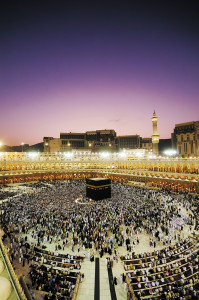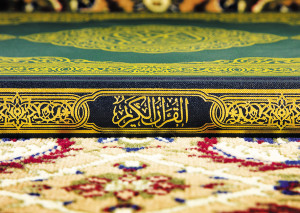Islam is considered to be a “noble and great religion of peace.” This statement is made upon the basis of  percentages (peaceful Muslims compared to violent ones). On the face of it, this seems like a logical assumption; indeed, with some 1.6 billion Muslims in the world, it is obvious that only a comparative “handful” comprise the radical “fringe” groups like ISIS, al-Qaeda, Hamas, Hezbollah and Boko Haram. Like many non-Muslims, I have Muslim friends, neighbors and acquaintances, and they’ve never threatened or harmed anyone. Certainly, the vast majority of Muslims are peaceful while the “trouble makers” number only in the tens of thousands, at best.
percentages (peaceful Muslims compared to violent ones). On the face of it, this seems like a logical assumption; indeed, with some 1.6 billion Muslims in the world, it is obvious that only a comparative “handful” comprise the radical “fringe” groups like ISIS, al-Qaeda, Hamas, Hezbollah and Boko Haram. Like many non-Muslims, I have Muslim friends, neighbors and acquaintances, and they’ve never threatened or harmed anyone. Certainly, the vast majority of Muslims are peaceful while the “trouble makers” number only in the tens of thousands, at best.
So, when it comes to terrorist acts committed under the banner of Islam, many people, including our President, claim that “those are not true Muslims,” or that the religion has been “hijacked” by thugs.
So what, exactly, is going on here? Are those terrorists truly Muslims? Are their barbaric acts really done as some perverted expression of religious faith? The big question—the elephant in the room that few people seem willing to grapple with—is: Is the Muslim faith—Islam—a religion of peace, or not?
The answer is… both yes, and no. It all depends upon the individual, their interpretation of their scripture (the Qur’an) and the measure of their willingness to submit and follow the commands of their faith.
A Quick Islamic Primer
Islam was conceived roughly 1400 years ago by an individual; the Prophet named Muhammad. In the year 609 CE, at the age of forty, it is claimed that Muhammad began receiving verbal revelations from God—Allah—by way of the angel Gabriel. Over a period of the next twenty-three years, until his death, Muhammad received from Gabriel, what Muslims consider God’s most definitive, un-corrupted book of scripture—the Qur’an—which is the primary life-guide for all Muslims. Muslims believe that the Qur’an expresses no human’s words, but is rather a perfect text, with each word and letter fixed, precisely, by no one but Allah.
In addition to the Qur’an, Muslims are to follow the Sunnah, which essentially means to follow the way of life of Muhammad, and the Hadith, which is scripture that includes the saying and teachings of Muhammad. Together, these sources form the basis of Sharia—Islamic Law.
A foundation of Muslim life is five, mandatory, basic acts, usually referred to as The Five Pillars of Islam. They are:
1. Shahadah: The declaration that there is no god except Allah, and Muhammad is God’s Messenger.
2. Salat: Muslims are to pray five times a day.
3. Zakat: Muslims are to give 2.5% of their savings to the poor.
4. Sawm: Muslims are to practice fasting and self-control during the holy month of Ramadan
5. Hajj: Muslims must travel (pilgrimage) to Mecca at least once in their lifetime, if they are able.
From Muhammad to Sunni & Shia
While Muhammad recognized the other major monotheistic religions that existed in his time (Judaism and Christianity) he believed Jesus merely another of the biblical prophets, and claimed that he alone, was God’s final, chosen prophet—Allah’s Messenger to humanity, for all time. One of the most important verses in all Islam is the required proclamation of faith: There is no god but Allah, and Muhammad is the Messenger of Allah.
According to Islam, all other scripture, such as the Torah, Proverbs, Psalms, and the Four Gospels of the New Testament, have been superseded by the Qur’an. It is, according to the Muslim faith, a book of scripture that is superior to all others.
Muhammad is said to be—like Jews and Christians—a direct descendent of Abraham, although his lineage follows the blood line of Abraham’s son, Ishmael, whereas Jews and Christians are descended from Abraham’s other son, Isaac.
After Muhammad’s death in 632 CE, his followers were divided in their belief as to who should be his rightful successor—the first Imam or Caliph. One group, the Shia, believed that Muhammad’s son-in law, Ali, was the rightful successor, and to this day believe he was the first Imam. The other group, the Sunni, accepted Muhammad’s senior companion and father-in law, Abu Bakr, as the first Caliph (and accept Ali as the 4th Caliph).
Today, Sunnis are the vast majority, comprising somewhere between 75 and 90% of the Muslim population.
Change is Needed
With so many non-violent Muslims in the world, it is a sad state of affairs that so much attention surrounding Islam must be related to violence and terror, but that is reality. The sad truth is, in the context of history and by the evidence of the current state of the Muslim world, we must seriously consider Islam in very different terms than we traditionally have. The threat posed by militant Islamic extremists is very real. It is a threat not only to the United States and the West, but to the entire world, both Islamic and non-Islamic alike. So when I say “we,” I am not only speaking to non-Muslims; indeed, and perhaps even more so, I am also speaking to all Muslims who consider themselves to be compassionate and peace-loving.
First of all, our understanding of the fundamental nature of Islam must change. For example, in the context how most Americans think of Islam, it is a religion. This is our first mistake. Islam is very much more than a religion. It is a socio-religious, socio-political system that fully encompasses the educational, economic, cultural, familial, judicial, legislative, militaristic, and spiritual realms.
It would perhaps be more accurate to refer to Islam by the name of the black separatist group of Malcolm X, as the Nation of Islam. Yet it is a nation that cannot be culled out in the sense that most of us think of nations. It is not like dealing with a country such as Iraq or North Korea. It is a nation unlike any other, without borders or physical constraint. It affects entire countries and has been a reckoning force in the world since Mohammad first conceived it, some 1,400 years ago.
Why do they hate us?
One of the best explanations I know of for why so many Muslims apparently hate the West, can be found in the book, What’s so Great About America, by Dinesh D’Souza. In it, D’Souza explains that, far from being “crazed fanatics,” or “insane murderers,” fundamentalist, Muslim terrorists are intelligent, resolute fighters who believe they are fighting us (the West), in part, to defend their way of life.
At first, this explanation seems absurd. Western culture is largely based upon freedom and a “live and let live” mentality. Do what you like, so long as it doesn’t hurt anyone. Why don’t they feel this way? We aren’t attacking them. We aren’t telling them how to live. Why aren’t they willing to leave us alone?
In Western, developed nations, governments and legal systems primarily operate on a secular basis. Democracy and a separation of church and state, allows for religious freedom. So long as their practices don’t harm others, our system allows the free expression of all religions. Muslims are free to worship Allah, here in America, without fear of persecution.
But this is not the case in Muslim-ruled countries where Sharia law reigns. There is no democracy or freedom of expression. The very freedoms we value so much are viewed as threatening to much of the Islamic world. The fact is, many devout Muslims view the West as corrupt and corrosive. What we view as religious freedom and tolerance, they view as blasphemy (remember, no other God but Allah). What we understand as First Amendment rights and the freedom of expression, they see as our sanctioning and promotion of filth, depravity, and perversion.
So, again, why can’t they just leave us alone? Because, increasingly, by virtue of modern technology, we are not leaving them alone, and as our differences become greater, the more committed they become at lashing out against us. Consider, for a moment, just how severe our cultural differences are becoming. For example, here in the United States, we not only tolerate adultery, we tell jokes about it, and we even now have actual businesses and websites that “sell” extra-marital affairs. At the same time, in some Islamic-ruled countries, if it is discovered that a woman “cheats” on her husband, it is perfectly acceptable for that woman to be stoned to death or executed by her husband. The differences could not be more striking.
Please understand, I am by no means defending the actions of what we call Islamic terrorists, but it is important that we understand their nature, motivations and level of commitment to their cause, if we are ever going to prevent them from harming us.
The other, perhaps larger issue we must deal with is the intent and long-term goal of much of the Muslim world—that is to convert all nations and people to Islam. The fact that anyone would refuse to submit to Islam is unacceptable to many devout Muslims, as Islamic scholarship divides the world in two: 1) The House of Islam (dar al-Islam), which is comprised of all nations submitted to Islamic rule, and 2) The House of War (dar al-harb), which are all nations that have not submitted to Islam.
By strictly following the teaching concerning this division of humanity, it is incumbent on dar al-Islam to make war upon dar al-harb, until all nations submit to the will of Allah and accept Sharia law. The history of Islamic conquest testifies as to the clarity of the message here: Submit or Be Conquered.
Where Does Their Reasoning Come From?
What is this faith? The actors here claim to be the faithful followers of Muhammad, the Prophet of the one and only true God, Allah. They claim to be Muslim—the faithful believers and practitioners of the great religion, Islam. But, how can this be? How could anyone commit what the rest of the world considers cold-blooded murder—heinous atrocities—in the name of any religion?
Unfortunately, the justification for terrorists’ behavior and reason for the long standing conflict between Muslims and the West, and even the discord amongst Muslims themselves, is found in the text of the Qur’an itself. But don’t take my word for it—read it yourself. This is not a criticism or an opinion, it is fact.
If one compares the Qur’an to other sacred texts (the Bible, for example) several glaring differences become obvious. The first is violence and force. In the Bible, all violent acts are described within a context of historical record. There are no “orders” or commands that believers kill non-believers. As a Christian, one is to be a “salesman” of sorts. One is to share the Gospel (good news) of salvation and hope that it speaks to your heart. Christianity is all about “free will” and “choice.”
The Qur’an, on the other hand, contains numerous references where believers are to convert or “strike down” (kill) the non-believers. Furthermore, according to Islamic scripture, to fight and die in the cause of Allah is among the most highly recognized and valued acts.
Another major difference is the very nature of God. In the Bible, in the New Testament alone, there are literally hundreds of references to love; in fact, love is the overriding theme of God’s relationship with all mankind; the central claim of Christianity is that God, as Jesus, died for our eternal salvation. By comparison, there are virtually no references in the Qur’an describing God as a God of love. In fact, there are only two references where it is stated that God loves man, and only one, clearly so. While the terms “compassionate” and “forgiving” are used frequently, it is curious that “love” is virtually absent. God, as described in the Qur’an is a god of power and control, and sometimes forgiveness, but not love.
The problem here is, just as a large number of Christians have never actually read the entire Bible from cover to cover, I suspect the same holds true for vast numbers of Muslims. And this is the crux of the issue. It is the “fanatical fringe” who have read every word, and take it so literally, they comfortably justify their barbaric actions on the basis of their interpretation of sacred scripture. They truly believe they are working for God.
On a purely spiritual level, if one considers the obvious, obscene barbarism on display today as enacted by groups like ISIS and Boko Haram, where children are enslaved, raped and murdered; where crucifixion and burning people alive is acceptable, every peace-loving Muslim might want to consider these actions on the basis of some Christian teachings:
Beware of false prophets, who come to you in sheep’s clothing, but inwardly they are ravenous wolves. You will know them by their fruits. Do men gather grapes from thornbushes or figs from thistles? Even so, every good tree bears good fruit, but a bad tree bears bad fruit. A good tree cannot bear bad fruit, nor can a bad tree bear good fruit. Every tree that does not bear good fruit is cut down and thrown into the fire. Therefore by their fruits you will know them. – Matt. 7:15-20 NKJV
And it is likely that in many cases, the extreme violence is a case of “follow the leader,” particularly as it appears that many of the terrorists tend to be young men. Whether they are led by some doctrinal belief or simply by following others they view and consider as leaders, whatever the case, they are simply finding license for behavior that most of the world deems repugnant. They are allowing their most base, carnal and depraved impulses to run wild, justifying their actions by de-humanizing their victims, just as the Nazis did as they calmly tortured and burned thousands of Jews in the Holocaust.
What is the Answer?
The recent Charlie Hebdo Massacre, the rise of ISIS and a resurgence of al-Qaeda are all potent reminders that what some refuse to call a “war” still rages nonetheless. In fact, regardless of the ignorance or denial of our current administration, terrorism is on the rise and the terrorists are becoming bolder with each passing day. The 9/11 dark stain of evil has only grown more ominous in recent years.
While much has changed since 9/11, one thing that has not changed is the ever-present threat of radical, Islamic extremists. According to WND (formerly, World Net Daily) and other sources, there have been over 20,000 terrorist attacks, worldwide, since 9/11—some sources place the number closer to 25,000—all committed under a banner of what the perpetrators call their “faith.”
Certainly, the vast majority of Muslims interpret their scripture and practice a faith aligned with peace and compassion, and are no threat to anyone. But with Islam growing throughout the world, with some eight million or so followers within the United States, in order for terrorism to truly be vanquished, the real battle must be waged within the confines of Islam itself. Muslims must decide within and amongst themselves to what tenets of faith they will adhere. Muslims must take the lead by rejecting and universally denouncing any and all precepts that support terrorism in any form or circumstance: be it hostage taking, torture, targeting innocents, or whatever. They must reconsider any teachings or interpretations of scripture, if they are in conflict with principals of non-terrorist behavior.
Islam is sometimes referred to as “the straight path,” but even many Muslims will concede that there are deep theological and doctrinal concepts expressed in the Qur’an that make it something other than “straight.” If you disagree, maybe one should simply ask: If Islam is a religion of peace, why then do so many terrorists commit their dreadful acts under it banner?
In a 2004 article, in the Saudi government daily newspaper Al- Wanton, Prince Bandar bin Sultan, the Saudi ambassador to the United States, called for a Jihad against Saudi terrorists, to be waged by Saudi citizens. This is precisely what should occur. This is the kind of leadership that the United States government should encourage and support. Most of all, it is what Muslims should support, too.
In many ways, Islam is a seething cauldron of conflicting ideas. Misconceptions and confusion about its character and nature are ubiquitous, even amongst Muslims. This is, in and of itself, one of the major problems we must consider with regards to Islam. It is a problem for which the solution must come from Muslims themselves. Islam is fraught with complexity as it has struggled with its identity for its entire history. Jihad is an apt description of what has been occurring for these past several centuries, but it is time for Muslims to make a decision about their faith.
In order for terrorism to be stopped, it is incumbent upon Muslims everywhere to embrace this idea of Prince Bandar’s and take up Jihad against the terrorists. Further, Muslims must search their hearts, and, if need be, they must re-define and reform the very core of Islam altogether. The history of bloody discord between Islam and the West is compelling evidence that there will never be peace unless Muslims can do this.
And if they cannot, Muslims may want to consider searching for a higher truth.




